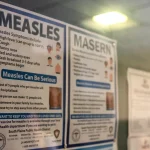SRINAGAR: On Wednesday, foreign diplomats from about fifteen nations were granted permission to watch elections in India-controlled Kashmir. This was the first time elections have been held in the disputed area since 2014.
Diplomats from the US, Mexico, Singapore, Spain, and South Korea were among the guests, according to officials in Srinagar and New Delhi.
Rifle-wielding soldiers waited outside polling places in India-controlled Kashmir as voters lined up to cast ballots in the election’s second phase—the first since New Delhi withdrew the region’s semi-autonomous status in 2019.
Following the appointment of Hindu-nationalist Prime Minister Narendra Modi, there were widespread arrests and an extended communications blackout, and the contested area came under direct government rule.
Locals say they are desperate for representation after ten years without elections, and AJK marked “Black Day.”
Since then, a governor appointed by the federal government has governed the territory in place of an elected administration.
However, New Delhi still retains the authority to make important decisions and can override laws that the 90-seat parliament has enacted.
On September 18, the first round of the three-phase election was place, and it is estimated that 61% of voters cast ballots.
Results of the final voting round, which takes place on October 1st, should be known a week later.
“This is a unique chance to visit Kashmir and witness democracy and the electoral process in action. The US embassy’s deputy chief of mission, Jorgan K. Andrews, commented, “It looks very smooth, everything is very professional.”
However, Modi’s detractors claimed that the diplomats’ visit was unnecessary.
Omar Abdullah, the leader of the local National Conference party, questioned the motivations of the Modi government and drew attention to the contradiction in its position.
The Indian government claims it’s an internal concern when international governments make comments. However, he added, they now want outside observers to come watch our elections.
After casting his vote, he declared, “Jammu and Kashmir elections are an internal matter for us and we do not need their certificate.” He also accused the Modi administration of intimidating and dehumanising the populace while utilizing its apparatus to imprison and repress them.
People are still casting ballots in spite of this, which Abdullah claimed demonstrated their tenacity.
Eager to be represented
Anger over the 2019 reforms and a high unemployment rate have fueled campaigning, and regional parties have vowed to fight for the return of autonomy.
After voting, Abdul Rahim, 52, stated, “We want a representative who will take our grievances forward.”
“We are suffering, and our children are incarcerated. Since the government revoked Article 370, which gave Kashmir its unique status, we have no representatives to challenge their actions.
“We’ve been left to God’s mercy since the last election ten years ago,” forty-year-old Tariq Ahmed stated after casting his ballot.
“I’m glad that this election is taking place. I hope we have a representative of our own so that impoverished people like me may bring up daily concerns.
‘Black Day’
In the meantime, protests were staged in Azad Jammu and Kashmir (AJK) on both sides of the Line of Control (LoC) in response to the “Black Day” marked in relation to the elections in India-held Kashmir.
Many people, including leaders of many political and religious parties, participated in the Muzaffarabad protests organized by Pasban-i-Hurriyat Jammu & Kashmir.
Demanding international assistance to settle the Kashmir dispute, the demonstrators marched in the direction of the UN observer office.
Protest processions and demonstrations were organized in Rawalakot and Mirpur, with participants brandishing pro-freedom and anti-India placards.
Speaking at the rallies, the speakers proclaimed that elections of any kind in the Indian constitution’s internally recognized disputed occupied state of Jammu & Kashmir were illegal and could not replace the legitimate right of self-determination of the Kashmiris, which has been upheld by the international community through UN resolutions on the matter.
They proclaimed that the people of Jammu & Kashmir would not, and had never, accepted India’s illegitimate occupation of their motherland, nor would they ever accept it going forward.








